Rajesh Khanna: Zindagi Ka Safar
Dr Rajiv Vijayakar
He came, he saw, he crinkled his eyes. And conquered.
In a world that had already seen many a big star by the mid-'60s, the word 'Superstar' was first coined for Destiny's favourite Rajesh Khanna.
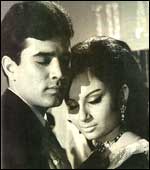 And if Jatin was his real name and 'Kaka' his pet name, the tag 'The Phenomenon', foisted on him by a famous scribe of those times, was just another index of his superstardom.
And if Jatin was his real name and 'Kaka' his pet name, the tag 'The Phenomenon', foisted on him by a famous scribe of those times, was just another index of his superstardom.
Destiny heavily indulged Jatin Khanna. His real origins remain a question mark, as he was the adopted son of indulgent parents. But when it came to struggle-time to make it as an actor, he remains the only actor to travel around, not on foot or by public transport, but by his own car. It is said that at different times during this phase he possessed an MG sports car and a Mercedes!
Then came the United Producers' Talent contest, which Kaka won, and which got him entry into films via G P Sippy's Raaz in early '67. The film was an also-ran, and was followed by the ordinary Baharon Ke Sapne, and two duds, Aakhri Khat and Aurat.
But Kaka's celluloid birth had indeed come about with the proverbial silver spoon. Who else could have begun - simultaneously - with names like G P Sippy, Ravindra Dave, Nasir Husain, Chetan Anand and S S Vasan? And as if this wasn't enough, the Shammi Kapoor-bhakt Shakti Samanta, crime specialist Raj Khosla, suspense master B R Chopra and sensitive talents like Yash Chopra and Asit Sen had already signed him for an array of roles that proved that they trusted their gut-feeling about Rajesh's competence as a multifaceted actor.
Without a single release in 1968 and the first ten months of 1969, the King-that-was-to-be waited in the wings. And in November 1969, Aradhana happened!
Hindi cinema had seen major cult films right from the Kismat-Mughal-E-Azam days. But the all-round youth appeal and national hysteria of Aradhana and Bobby has few equals even among the later mega-grosser romantic blockbusters.
The songs were a rage, Kishore Kumar slalomed past Mohammed Rafi, and Shakti Samanta (known for his crime capers) and the ooh-la-la glamour puss Sharmila Tagore etched out new and lasting reputations as purveyors of a far higher level of cinema.
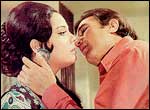 In a double whammy, he scored an encore with Do Raaste, another heart-tugger also marking the metamorphosis of Raj Khosla from an entertainer of fluff to that of a hard-hitting family drama on values.
In a double whammy, he scored an encore with Do Raaste, another heart-tugger also marking the metamorphosis of Raj Khosla from an entertainer of fluff to that of a hard-hitting family drama on values.
Released across the streets in downtown Mumbai at Opera House and Roxy cinemas respectively, Aradhana and Do Raaste settled down for a 100-week run that also entrenched Sharmila Tagore and Mumtaz, the two films' respective heroines, as the top two heroines in the pre-Hema era.
What a mass icon Kaka was! Girls swooned at the sight of him, grandmas wanted to mother him, still others married his photographs, and when Kaka married Dimple Kapadia in 1973, at least one girl slashed her wrists.
Even the men emulated him, the guru-kurta he often wore became a fashion statement. Women took to wearing it too, and the men wooed them with mannerisms whose copyrights rested with Kaka the great! Mannerisms that included that absolutely endearing yet fatally attractive smile with the crinkled eyes, those shakes of the head and the unique saluting gesture that accompanied them.
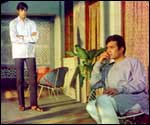 But to say that Khanna's charm and strength as an actor were restricted to this frills and packaging pluses would be to do a gross injustice to his formidable talent and range. He seared you with passion in Aradhana; haunted you with his pain in Amar Prem, and made you chuckle aloud in Bawarchi. Giving a new dimension in and as Anand to Frank Capra's observation that tragedy was an occasion when the audiences, and not the actors, cry, Rajesh Khanna unleashed a series of superlative performances, and with everything going right for him, spun an incredible 23 silver jubilees between November 1969 and November 1974, three of the films touching the 100-week mark.
But to say that Khanna's charm and strength as an actor were restricted to this frills and packaging pluses would be to do a gross injustice to his formidable talent and range. He seared you with passion in Aradhana; haunted you with his pain in Amar Prem, and made you chuckle aloud in Bawarchi. Giving a new dimension in and as Anand to Frank Capra's observation that tragedy was an occasion when the audiences, and not the actors, cry, Rajesh Khanna unleashed a series of superlative performances, and with everything going right for him, spun an incredible 23 silver jubilees between November 1969 and November 1974, three of the films touching the 100-week mark.
The list spanned Ittefaq and Doli, all released in the immediate aftermath of his twin breakthroughs, The Train, Bandhan, Saccha Jhutha and Safar in 1970, Aan Milo Sajana, Haathi Mere Saathi, Maryada, Anand, Kati Patang and that scene-stealing guest role in Andaz in 1971, Dushmun, Amar Prem and Apna Desh in 1972, Daag, Anuraag and Namak Haram in 1973, and Roti (his home production which almost saw him co-star with Dimple), Premnagar, Aap Ki Kasam and Ajanabee in 1974.
In this phase, Rajesh Khanna won a slew of awards, ended his possessive romance with Anju Mahendru (he had even high-handedly tried to burn the prints of her debut film Uski Roti), broke the heart of thousands with his whirlwind marriage to Bobby sensation Dimple (the baraat proceeded deliberately past Anju's house!) and enriched Hindi cinema forever with some fo its finest musical scores by composers ranging from R D Burman and his dad S D Burman to Laxmikant Pyarelal and Kalyanji Anandji, with inputs by other composers as well.
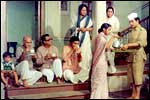 It was not just that he and his success tag inspired composers, lyricists and singers. It was simply that Kaka made it a point to take an active interest in his music. Composers had to make him hear the composition thrice over three days, and if Kaka remembered it after a week, it was approved of!
It was not just that he and his success tag inspired composers, lyricists and singers. It was simply that Kaka made it a point to take an active interest in his music. Composers had to make him hear the composition thrice over three days, and if Kaka remembered it after a week, it was approved of!
But success for Rajesh Khanna also had a flip side. Self-confessedly he said that he felt 'Next to God'. He held court every day and opportunists latched on to him as a coterie of 'yes-men' that finally came to have a major role in his quick downfall. Kaka weathered six major flops in 1972, but the insecurity of a fragile fame proved his undoing.
He confidently signed films with male co-stars Sanjeev Kumar, Amitabh Bachchan and Shashi Kapoor with 'campwalla' producers like J Om Prakash and Raj Khosla, and by resorting to manipulations ended up not only alienating the heroes but also distancing himself from self-respecting filmmakers, and ironically getting overshadowed on screen by these professional stars.
The Amitabh tidal wave was only the final nail in the coffin of his stardom, and Salim-Javed, slighted by Kaka several times, began spinning out successful multi-starrers with almost every hero other than Kaka.
On the home front too, trouble was brewing, despite the birth of two daughters who are aspiring stars today - Twinkle and Rinke. There were reports of his harassing wife Dimple. Also, post 1974, the turnips came thick and fast at the all-important BO. The sporadic Chhaila Babu (1977), Amar Deep (1979), Thodisi Bewafaii (1980), Avtaar and Souten (1983) and Maqsad (1984) could not keep him afloat and the Khanna ship capsized.
In 1980, Dimple too left her husband to don greasepaint, drowning her husband's control over her life in a Saagar of rebellion.
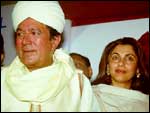 By the late '80s and early '90s, Khanna relinquished his claims to stardom and tried to make the headlines he had so effortlessly made in the golden past by his stepping into politics (as a Congressman) and making a hyped patch-up with his wife. In 1990, he acted in the video film Khudai, and tried to etch out success in character roles like in Swarg. Many years later he tried to enter the vibrant area of TV soaps with Batwara, and the launch made digs at archrival Amitabh and ensured media-coverage by inviting old associates like Shakti Samanta, Yash Chopra and even Anju Mahendru.
By the late '80s and early '90s, Khanna relinquished his claims to stardom and tried to make the headlines he had so effortlessly made in the golden past by his stepping into politics (as a Congressman) and making a hyped patch-up with his wife. In 1990, he acted in the video film Khudai, and tried to etch out success in character roles like in Swarg. Many years later he tried to enter the vibrant area of TV soaps with Batwara, and the launch made digs at archrival Amitabh and ensured media-coverage by inviting old associates like Shakti Samanta, Yash Chopra and even Anju Mahendru.
But the glory was gone forever.
December 29, 2001 sees Rajesh Khanna as the hapless victim of the same Destiny that had catapulted him to vertiginous heights of stardom, relegated to playing trite cameos in disastrous B-graders like K C Bokadia's Pyaar Zindagi Hai.
Four songs that he had immortalized on screen in his prime, Zindagi ek safar hai suhana/ Yahaan kal kya ho kisne jaana, Zindagi kaisi hai paheli haye, kabhi to hansaye, kabhi yeh rulaaye, Zindagi ke safar mein guzar jaate hain jo maqaam, who phir nahin aate and finally, Zindagi ka safar hai yeh kaisa safar, koi samjha nahin, koi jaana nahin, best epitomize the journey of this fallen star who will nevertheless have a page all by himself in the history of Hindi cinema.